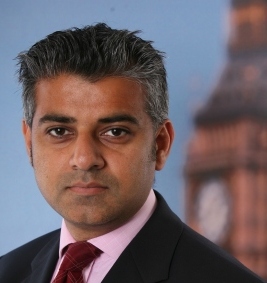Sadiq Khan has been selected as Labour’s candidate for London Mayor. He received just short of 60% of the vote in the final round of counting, with Tessa Jowell receiving just over 40%.
He now faces the uphill struggle of being elected in next May’s scheduled election.
[Adverts]
First preference results
6th place: Gareth Thomas, 1.2%
5th place: Christian Wolmar, 5.4%
4th place: David Lammy, 9.4%
3rd place: Diane Abbot, 16.8%
2nd place: Tessa Jowell, 29.7%
1st place: Sadiq Khan, 37.5%
The vote: how did it work?
Six Labour Party members were shortlisted for the ballot to select Labour’s mayoral candidate, and voting papers were sent out to three different kinds of Labour Party supporters:
•individual members of the Labour Party;
•affiliated members of the Labour Party;
•registered supporters of the Labour Party.
Affiliated supporters of the Labour Party are trade union members who have registered as affiliated supporters. Traditionally, trade unions would affiliate to the Labour Party and cast a block vote in selections which was notionally on behalf of all their members. Some unions balloted their members, and then cast the block vote in favour of the candidate who won the members’ ballot. However, the last Labour Party leader (Ed Milliband) came under criticism (mainly from the Tory-supporting media) for this system. It was criticised as old fashioned and for giving trade union leaders too much power. Miliband modernised the system, doing away with the block vote in selections and allowing individual trade union members to register personally as affiliated members – gaining an individual vote in the process. The right wing of the Party supported the move, believing they would get more support from “ordinary trade union members” than they had received from trade union leaders, who were seen as being on the left, compared with the views of their ordinary members. The right wing may not have judged it right: one of the reasons why left wingers keep getting elected as trade union leaders is because trade union members are often on the left.
Registered supporters of the Labour Party are essentially Labour voters who do not want to shell out the (quite high) fees to become full Labour Party members. By paying a flat rate of £3, they are entitled to vote in selection contests for national and regional positions (Labour Party leader, deputy leader and mayors). This category of membership was dreamed up by Labour Party right wingers. It is modelled on the “primaries” system in the USA, where ordinary voters participate in chosing the political parties’ candidates. The thinking behind this is that if a voter has been part of the process of choosing a candidate, he or she is more likely to vote for that candidate when the actual election comes about. Having pushed for Labour to adopt this system, the right in the Labour Party are now being hoist by their own petard. In the leadership contest currently underway, tens of thousands of Labour voters have joined up as registered supporters – and it is thought that most of them have joined in order to vote for the left wing candidate. The right wing initially tried to claim that left wing groups were infiltrating the process, but the numbers of supporters registering was so large that this argument holds no water. Winners under this voting system end up with a large popular mandate which it is hard for their opponents to argue against.
[Adverts]
Why did Sadiq win the selection contest?
There were two front-runners in the contest to be Labour’s mayoral candidate: Sadiq Khan and Tessa Jowell – and there is relatively little to choose between them. The one clear difference, though, is that many key figures on the left did not want to see Tessa Jowell become the candidate – and called for a vote for Sadiq as a “stop Tessa” candidate. Sadiq also took the gamble of running Labour’s election campaign in London in the May 2014 elections. Labour did well in those elections: although this was probably more down to the voters’ desire to back Labour as a protest against the then Coalition Government than because of Sadiq Khan’s inspiration qualities. However, the job meant that Sadiq got to meet many party members as he toured London boroughs encouraging the campaign. Tessa does have a history of holding meetings for women – but these have tended to be small-scale meetings of key women rather than large public meetings and have concentrated on rather dry goals. She has not been in a position to compete with Sadiq’s reach into the membership.
Some commentators are seeing Sadiq’s victory as confirmation that Jeremy Corbyn, the left candidate, will win the leadership contest (due to be announced tomorrow, Saturday, 12th). They are probably right: Sadiq was endorsed by key figures on the left (albeit more as a “stop Jowell” candidate than a “Sadiq’s our man” candidate) and that probably indicates that these figures have a following. What is even more promising, though, is the fact that Diane Abbott was in third place, with a much higher percentage of the vote than she won in last Deputy Leadership contest. Diane beat the three other contenders who were not the top two: that is the point which confirms that the left vote is riding high. If the left in the Party had united behind her in the way they have united around Jeremy Corbyn, this third place showing hints at the spectacular double victory that might have been.
[Adverts]
But can he win the election contest?
Now that the candidate has been chosen, Labour’s thoughts must turn to whether their candidate can win. Had Ed Miliband still been leader of the Labour Party – and, even more importantly, had the London Labour Party still been in charge of the campaign, it is hard to believe that Sadiq Khan could have beaten the Tory candidate (likely to be Zac Goldsmith). However, if Jeremy Corbyn is elected Leader of the Labour Party, the whole landscape changes. If Corbyn can keep the tide of support for him and his policies going after the election result is announced, and persuade many of his supporters to become full and active members of the Labour Party, there will be a huge fighting force to do the groundwork in electing a Labour Mayor. But the election will be won on the basis of politics, and “being well organised” cannot substitute for that. Corbyn and the Corbinistas will have to act quickly to change the nature of the London Party so that it can offer new policies which really will attract the voters: once the voters are won over, good organisation will make sure they go out and cast their vote.
The elections in London next May – for the London Mayor and the Greater London Assembly – are very important because they will determine which Party runs London for the next four years. They are even more important, because they will help determine who forms the next government, in or even before 2020. A victory in London will fuel a Labour bandwagon; a loss would see the knives come out for Corbyn. The Tories and the shady ultra right wing pull out everything they can to try to stop Corbyn: they won’t give up London without the fight of their lives.
Does Khan have the political sophistication to realise this? The jury has to be out on that one. Already he has intimated that he will resign as MP for Tooting straight away, to concentrate on the mayoral campaign. This will force a by-election within weeks, the first test of a Corbyn leadership, and the thought that Khan really is a bit of a plonker. Although Labour should hold Tooting, the fact that there is an election will give the right wing media a long spoon to stir with: Labour must hold the seat and hold it well if they are to be discouraged. If Khan wants to win, he has to become a Corbinista: is he willing and able to do so?
[Adverts]
 East London News A Force for the community…
East London News A Force for the community…




